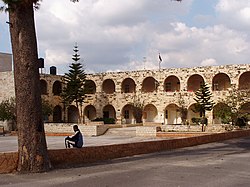Tulkarm
| Tulkarm | ||
|---|---|---|
| Other transcription(s) | ||
| • Arabic | طولكرم | |
| • Also spelled | Tulkarem (official) Tul Karem (unofficial) |
|

A school in Tulkarm, 2007
|
||
|
||
| Location of Tulkarm within the Palestinian territories | ||
| Coordinates: 32°18′42″N 35°01′38″E / 32.31167°N 35.02722°ECoordinates: 32°18′42″N 35°01′38″E / 32.31167°N 35.02722°E | ||
| Palestine grid | 152/190 | |
| Governorate | Tulkarm | |
| Founded | Late 12th century | |
| Government | ||
| • Type | City | |
| • Head of Municipality | Mahmoud al-Jallad | |
| Area | ||
| • Jurisdiction | 28,793 dunams (28.8 km2 or 11.1 sq mi) | |
| Population (2007) | ||
| • Jurisdiction | 61,941 | |
| (includes refugee camp) | ||
| Name meaning | The long (place) of the vineyard. | |
| Website | www.tulkarm.org | |
Tulkarm or Tulkarem (Arabic: طولكرم, Ṭūlkarm); is a Palestinian city in the West Bank, located in the Tulkarm Governorate. The Israeli city of Netanya is to the west, the Palestinian Nablus and Jenin to the east. According to the Palestinian Central Bureau of Statistics, in 2007 Tulkarm had a population of 51,300 while its adjacent refugee camp had a population of 10,641.
The Arabic name, which translates as "the long (place) of the vineyard" is derived from the Aramaic words Toor Karma, meaning "mount of vineyards."
During the Ayyubid era, after the Muslim reconquest of Palestine under Sultan Saladin in 1187, the first families to settle in Tulkarm were from the Kurdish clan of Zaydan. A military group, the Zaydan were dispatched to the Wadi al-Sha'ir area, which includes Tulkarm, by Saladin to buttress the defense of the western approaches of Muslim-held Palestine from the Crusaders who dominated the coastal area. The Zaydan would come to politically dominate Tulkarm and the vicinity until the early 17th century. Around 1230, during the late Ayyubid period, a group of Arabs from southern Palestine immigrated to Tulkarm. They had originally migrated to Palestine from Arabia many generations prior and had become semi-nomadic farmers and grazers. Among the Arab families were the Fuqaha clan, who were considered ashraf (related to the Islamic prophet Muhammad) and served as the 'ulama (religious scholars) of the village.
...
Wikipedia


